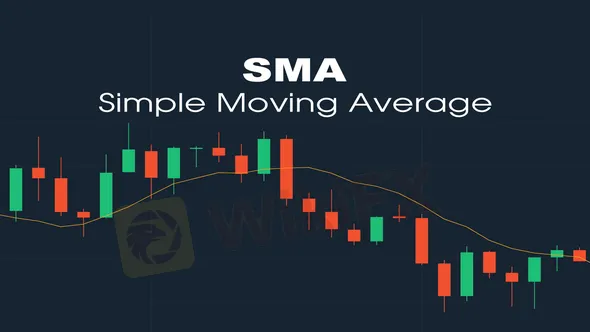简体中文
繁體中文
English
Pусский
日本語
ภาษาไทย
Tiếng Việt
Bahasa Indonesia
Español
हिन्दी
Filippiiniläinen
Français
Deutsch
Português
Türkçe
한국어
العربية
Simple Moving Average: The Common Forex Indicator
Abstract:Let’s explore important technical indicator and market insights used by traders. One of the most commonly used indicator by trader is the Simple Moving Average.

The simple moving average (also known as SMA) operates at a slower rate than the current market price (called a delay indicator). It also uses a lot of historical price data. In fact, its more so than most other strategies.
A good sign that the recent price is higher than the previous price is that the long-term moving average is lower than the short-term moving average. This can be seen as a sign of purchase due to the upward trend in the market.
It refers to the selling signal due to the downward trend, as well as in the opposite scenario where the long-term moving average is higher than the short-term moving average. The moving average is generally used as evidence of the overall trend, not purely a foreign exchange transaction signal.
In other words, two strategies can be mixed to discard breakout signals that do not match the general trend proposed by the moving average. Of course, this is a great way to make breakout signals much more productive. A warning about a selling signal indicates that the short-term moving average is lower than the long-term moving average, so you can place a selling order.
However, given a buying signal, it generally means that the short-term moving average is higher than the long-term moving average.

Disclaimer:
The views in this article only represent the author's personal views, and do not constitute investment advice on this platform. This platform does not guarantee the accuracy, completeness and timeliness of the information in the article, and will not be liable for any loss caused by the use of or reliance on the information in the article.
Read more

Webull and Others Fined $275,000 for Incomplete Suspicious Activity Reports
Webull Financial, alongside Lightspeed Financial Services Group and Paulson Investment Company, LLC, has agreed to pay a collective fine of $275,000 following an investigation by the US Securities and Exchange Commission (SEC). The penalty was issued due to the firms’ failure to include essential information in suspicious activity reports (SARs) over a four-year period.

Barclays Resolves £40M Fine Over 2008 Fundraising Disclosure Failures
Barclays has reached a settlement with the UK’s Financial Conduct Authority (FCA), agreeing to pay a £40 million fine for failing to adequately disclose arrangements with Qatari investors during its critical fundraising efforts amidst the 2008 financial crisis.

WikiEXPO Global Expert Interview: Advanced Practices and Insights in Financial Regulation
In the midst of rapid advancements and evolving landscapes in financial technology, financial regulation, and ensuring financial security, WikiGlobal stands at the forefront, closely tracking these transformative trends. As we embark on our series of exclusive interviews focusing on these pivotal areas, we are delighted to have had an in-depth conversation with.

Alleged Concerns with TradeEU.global's Trading Practices
An individual trader has come forward with allegations of an unfavourable experience while using the services of the broker TradeEU.global.
WikiFX Broker
Latest News
Saxo & Portuguese Bank Partnership
SEC Fines Broker-Dealers $275K for Incomplete SAR Filings
Elon Musk Warns of Imminent US Bankruptcy | Bitcoin Retreats from $100K
UK FCA Fines Barclays £40 Million Over 2008 Deal
WikiEXPO Global Expert Interview: Advanced Practices and Insights in Financial Regulation
Justin Sun Invests $30M in Trump-Backed World Liberty Financial
Lured by False Promises: Malaysian Driver Lost RM218K to an Investment Scam
FTX Sets March 2025 Timeline for Creditor Payouts: What It Means for Investors
What is an Economic Calendar? How it works
Pros & Cons of Automated Forex Trading
Currency Calculator


